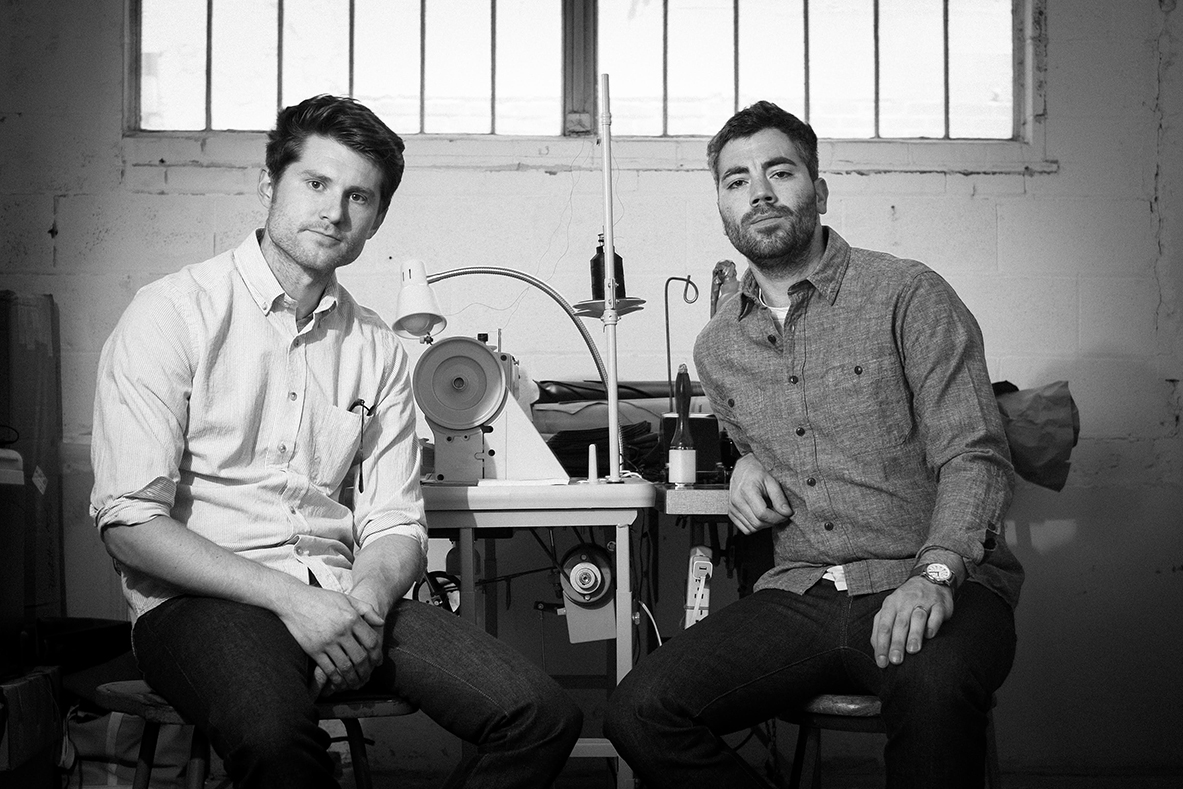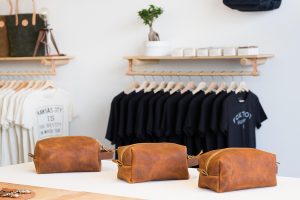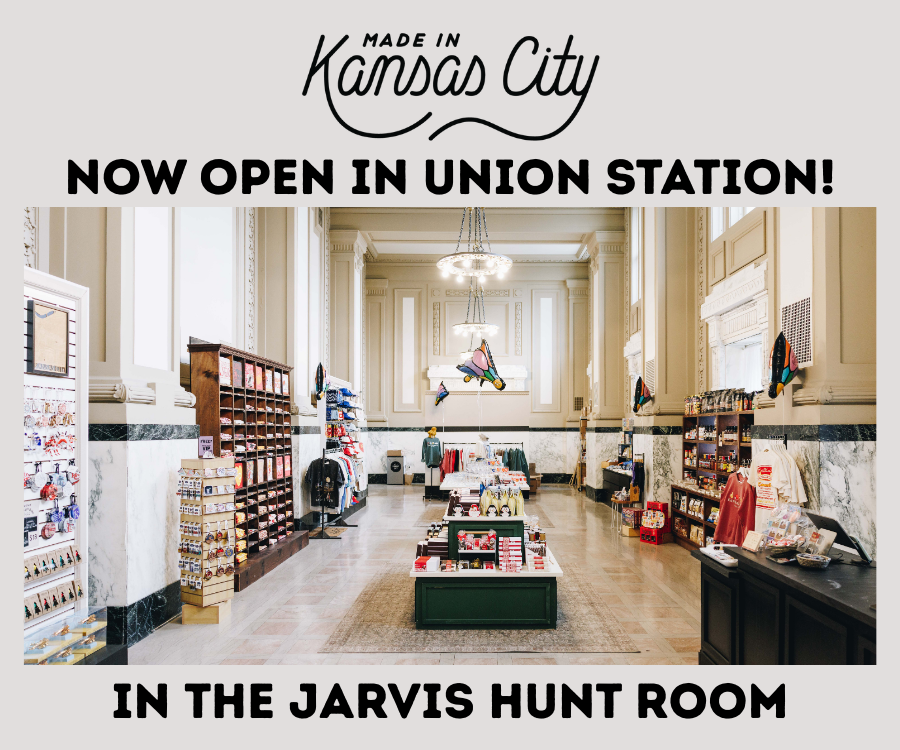A large butcher block table stands between the owners of Foxtrot Supply Co. and its customers. But the found-object centerpiece of their Crossroads store is meant as a meeting place, not a barrier, said Ryan Hetu.
“It’s alluring, inviting and kind of vulnerable,” the Foxtrot co-founder explained.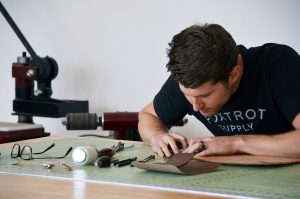
Stitched into the high-traffic fabric of First Fridays in the arts district, the shop boasts simple, high-quality leatherworks — many of which are designed and crafted by co-founder Jordan Fox on the sturdy countertop.
“The products that we do — as far as the leather goods and things that are made by hand — really beckons this intimacy,” said Fox, assembling a wallet at the table as he spoke. “We wanted to be really transparent — to have people come in and say, ‘Oh, I really like this,’ or ‘Why did you do the bag like that?’ Really listen to them, take it all in and absorb it.”
Opening its doors in April at 115 W. 18th Street — Suite 100 of The Bauer — a physical space for honest conversation and collaboration has only helped fuel what the co-owners described as the business’ rapid growth.
“People can come in and actually feel and touch things, and then they’re like, ‘OK. I understand the value of this item,’” Fox said.
“We’re always learning and that’s what keeps this going. It’s that simple,” Hetu said. “Someone could literally come in and give the owners of this company feedback instantly, rather than send an email through a chain and hope somebody reads it. We’re actually here Thursday through Saturday.”
Though the store’s goods largely are unisex — possibly skewing toward men, Hetu said — Foxtrot plans to expand its existing line of bags, as well as adding greater emphasis to its limited edition clothing offerings.
“We want to cover the gamut of lifestyle,” Hetu said. “We like the small goods because with things like wallets, accessories, key clips, and home goods like desk pads and mouse pads, it’s fun to show people that this level of quality exists. But we see bags as the next big thing for us.”
The duo is eyeing production of six or seven models, from handbags to computer bags, he said.
“We want to maintain a really high quality, which we already do, but some of our materials cost too much honestly,” Hetu said. “We’re always thinking about what the prices should be. We’re in the Midwest, but we have people on the coasts buy us more than anybody. Eighty percent of our sales in the store are from people from out of town.”
“A lot of those people are like, ‘We just really like that it doesn’t say Kansas City on everything,’” he added. “Part of our thinking here in the Crossroads or other areas coming up, is just getting away from the quick sale.”
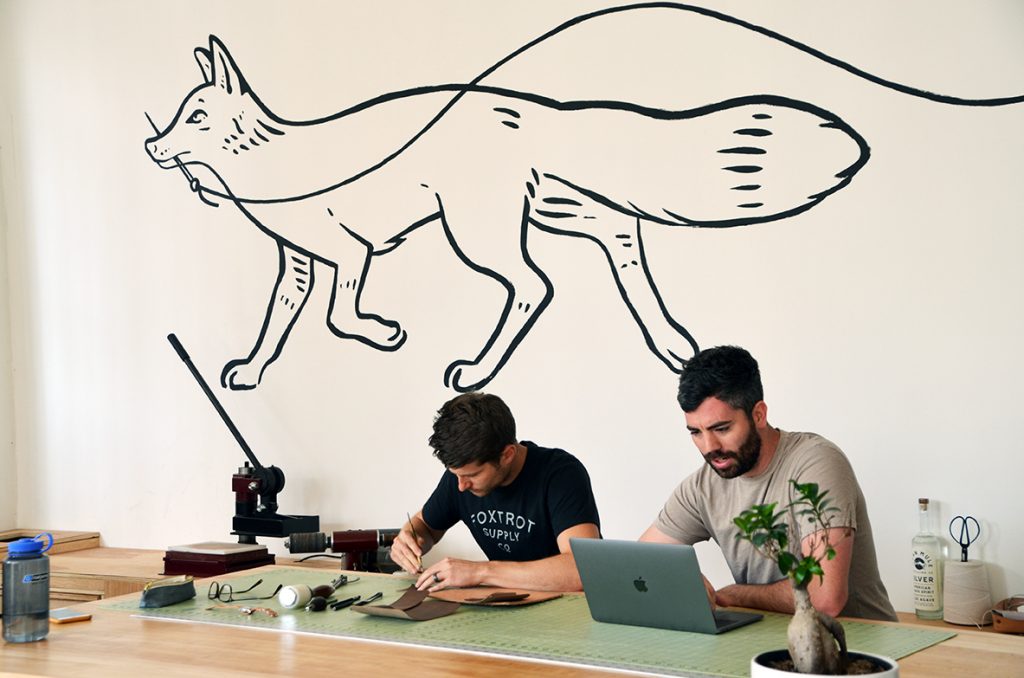
Jordan Fox and Ryan Hetu, Foxtrot Supply Co.
More than ‘makers’
Beneath a mural of Foxtrot’s logo — painted by neighboring artist Lance Flores — the entire space is intentionally designed to reflect the co-owners’ philosophies on business, as well as life, they said.
“If we’re selling ourselves as a lifestyle brand, we actually have to live it,” Hetu said. “Our lifestyle is buying few, but nice-quality things; buying the things we know we need and deserve, rather than just buying the cheap version constantly. We want things that last, so we make things that last.”
“‘Lifestyle brand’ is a weird description, but we set out to influence with more than just wallets and goods,” he added. “That’s just an in-between to make some sort of connection.”
Hetu winced at using buzzwords that often over-simplify concepts that are more nuanced than a mere label, he said.
“There’s something about being stretched and challenged that grows us individually and together in the community,” he said. “That’s really the mission. I hate words like ‘maker.’ We’re not makers. We’re designers. We create ideas and they become real things.”
“When you have a craft — and I hate to use that word because it sounds like ‘make’ and can sound so small — but when your craft is your passion — another buzzword — you need to be making, being an activist, whatever,” Hetu added. “If you are literally living what you feel, that takes courage and vulnerability. Anybody who does that is a hero because it can be really difficult.”
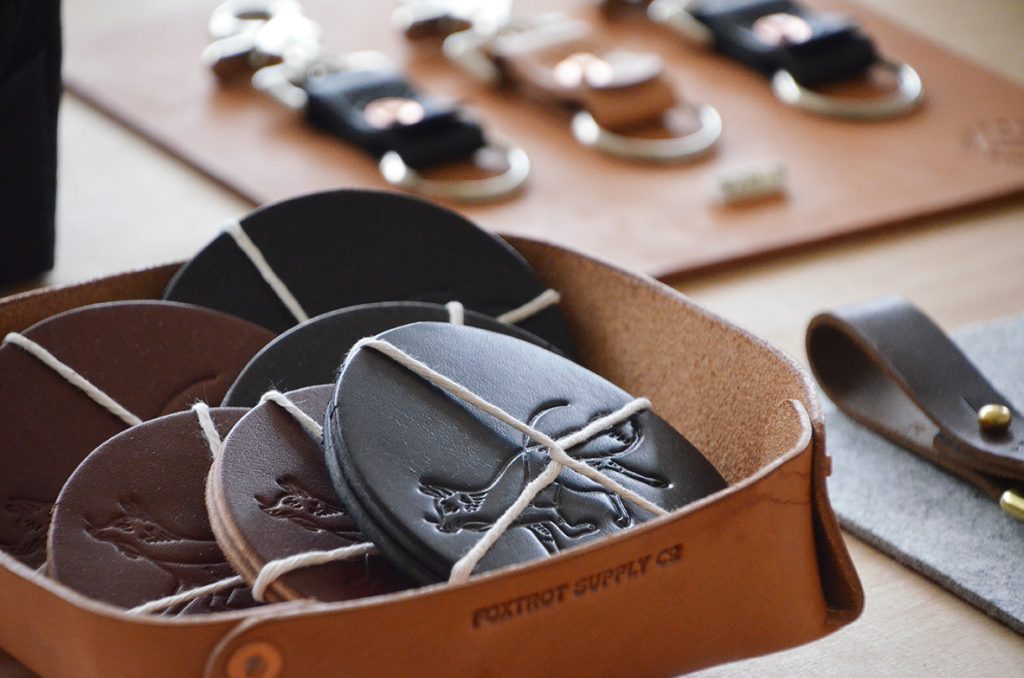
Comfort in a conflicting idea
Jordan and Hetu’s journey began as adult neighbors chatting about business ideas and wondering how they could create a version of success that best matched their expectations — not those of society around them, they said.
“Neither of us are people seeking to drive the hottest, newest cars or have toys — like most boys in town,” Hetu said. “It’s not that I don’t want a BMW 2002 from 1970, but those things aren’t drivers for us. Those are ways some people try to appear more than they are.”
“It’s a dry path,” he added. “It doesn’t produce the fruit that you want.”
The pair started online a little more than two years ago, selling Fox’s goods on etsy before moving production to a warehouse space and eventually opening a small retail shop in Goodrich Alley, west of the Bauer.
More and more, they gravitated toward building stronger community ties with fellow entrepreneurs and artists, they said, a move that had the unintended consequence of further strengthening their business.
“It’s been really awesome because old friends and connections have given us some private label-type jobs even though these people haven’t been very private about it,” Hetu said. “They’ve been really good to us and been like, ‘Hey, this is who makes our stuff, even if it has our brand name on it.’”
One recent example of such collaboration: Foxtrot crafted leather coasters for Kansas City-born MADE Urban Apparel, which now are being sold at the new, high-profile Made in Kansas City Marketplace on the Country Club Plaza.
Such success — though Hetu is hesitant to use the word — has helped the co-founders better achieve their goal: more content lives.
“We’ve put every dollar in. We worked hard — sometimes absurd hours,” Hetu said. “And now we’ve set a retail store to be open three days a week. That allows us to have that other time for ourselves. And that’s what matters: to be with our families, to be with our friends. That’s so much more ‘success’ to me — to have physical time rather than tons of money and no time. I don’t want to be 55 years old or older with kids and thinking, ‘I wish I would’ve been around more.’”
Hetu would be happy if Foxtrot made $300,000 to $400,000 annually, he said, noting again that financial wealth doesn’t always equal happiness.
“We built something where we don’t look for a tech company number. We ask ourselves, ‘Wouldn’t it be great if we had salaries that were easily considered very high in Kansas City for doing something we could do three to four days a week?’” he said. “That’s our model, and it’s working. And the store is definitely a protest to the idea that everything needs to be done online.”
Bucking trends and carving one’s own path isn’t unique to Foxtrot, Hetu said.
“Anyone can do it. Kansas City is literally that town,” he said. “A lot of people have anxiety to lose what they have because they think they’ve earned it, or they think they own it — we don’t own anything. We have it for the time we’re here.”




